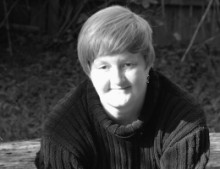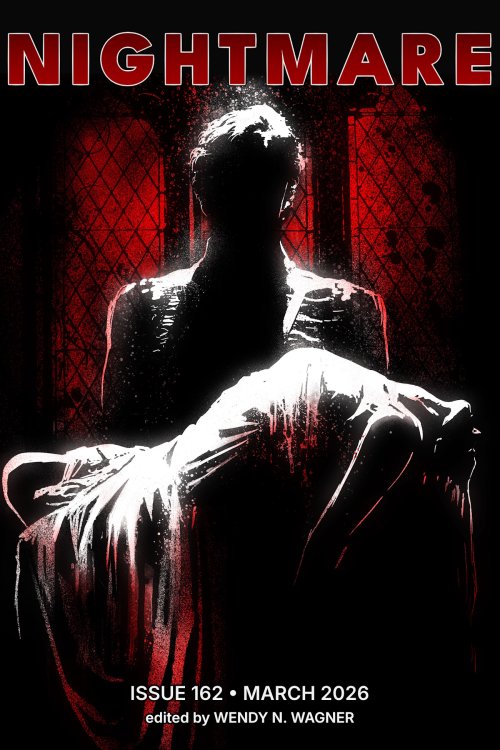What began with a bittersweet consideration of life and death soon became somehow both darker and much more poignant. What can you tell us about the inspiration behind Barley’s afterlife?
Thank you! I started writing this story for an anthology or themed-magazine prompt (can’t recall which). The theme was “new and different ghost stories.” We were walking our dog (this was 2020, and he got many walks that year) and my wife Chrissy and I were discussing submission calls that I used as prompts to produce stories.
At the same time, my dog investigated something like a dead rabbit—something gross—and as always, I wondered what the heck he was thinking. What does the world look like to a creature like that? My dog also has strong herder stock and clearly sees himself as the sheepdog to our family. So by the end of the walk we imagined a ghost dog who was so protective he couldn’t bear to pass on.
The Ghost Eaters come because the ghost is no longer really who they were in life. The story really started to shine after that. It’s about Barley trying to get back to being himself, in a very weird way.
The Ghost Eaters weren’t very scary in the first draft. They were just weird purple blobs. In 2022 I had been reading Stephen Graham Jones and realized that this story could easily be horror if I twisted them up.
The Not-Dead Dogs and Barley explore the circle of life and death. I found it interesting that the Someone is able to interact with both dogs in his own way, almost as if they are different guises of the more traditional view of dogs as servants of Death. Do you have a particular story or folktale involving dogs, or is a story like this an exploration of something new? Did you ever see the Someone as another face of the Moving Dog?
Good questions. I often write stories that are very informed by research and traditional stories—but not this one! My own dog was all the research I did, and he was mostly cooperative.
Regarding the last question: I think of the Someone as a loophole in the rules of life and death. I like the idea that they might be an unknowing avatar of the afterlife, since they wander around helping ghosts to be remembered and thus pass on.
Maybe there’s more stories left for the Someone. Ghost hamsters?
Rules are meant to be broken and publishing is filled with old “rules” that guide successful stories. One of them is “Don’t kill the dog. Ever.” This story starts with a dead dog, moving to the hope of something more. What other writing rules would you like to see broken as a reader? As a writer?
I always tell students that writing rules are fun to break, if you’re smart about it. You can start with four or five characters as long as each one is introduced via some unique trait. You can switch protagonists (like Jones does in The Only Good Indians) if it’s dramatic enough. If someone wakes up and looks in the mirror on the first page of your book, go ahead, but make it interesting. (See Kafka!)
As a reader, I would love to see publishing support more serialization and short stories. (But this is selfish, since I am working on something that would work best as a serial, and I write short stories.)
Also as a reader, I’ve seen the most exciting SFFH lately come from writers who aren’t in the traditional white straight male club. Jade City and The City We Became especially stuck with me. But I’d also like to see us stop this soft-policing that makes anyone not white feel like they have to tackle their cultural identity. Somewhere, there’s a Native American writer who really just wants to do a medieval European fantasy. Let them! When agents, editors, marketing departments and Goodreads reviews all use the author’s ethnic identity to market, it just makes white the default setting again.
You’ve dipped your toes into fiction, nonfiction, and music. If you could write a letter to younger Spencer, the one just setting his eyes on the stars, and offer a few words of encouragement, what would they be?
Don’t tether personal validation to creative achievement! Books don’t always sell like gangbusters, and your best writing might be in a short story that takes years to find a home. And in the immortal words of the jazz musician in That Thing You Do, ain’t no way to keep a band together.
What’s next for Spencer Ellsworth? What can fans look forward to in the future?
I’ve been working on a nineteenth-century American fantasy since 2018. It is Too Large, so I am trying to extract one novel from it to start. I’m also writing many short stories set in that world, and one has appeared in Beneath Ceaseless Skies this year (bit.ly/3wEslST).
I also write geek blather on a Medium channel called Fanfare (medium.com/fan-fare) and it’s really fun. I have a regular column about early drafts, abandoned ideas and fan edits of various franchises (bit.ly/3AxfIuT). If that’s your thing, follow and Medium will actually give me (a little) money!









